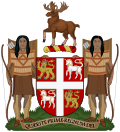| Premier of Newfoundland and Labrador | |
|---|---|
 | |
 | |
| Office of the Premier | |
| Style |
|
| Status | Head of Government |
| Member of | |
| Reports to | |
| Seat | Confederation Building, East Block, St. John's |
| Appointer | Lieutenant Governor of Newfoundland and Labrador with the confidence of the Newfoundland and Labrador Legislature |
| Term length | At His Majesty's pleasure contingent on the premier's ability to command confidence in the legislative assembly |
| Formation | 1 April 1949 |
| First holder | Joey Smallwood |
| Deputy | Deputy Premier of Newfoundland and Labrador |
| Salary | $95,357 plus $39,514 (indemnity and allowances) [1] |
| Website | Office of the Premier |
The premier of Newfoundland and Labrador is the first minister and head of government for the Canadian province of Newfoundland and Labrador. Since 1949, the premier's duties and office has been the successor to the ministerial position of the prime minister of the former Dominion of Newfoundland. Before 2001, the official title was Premier of Newfoundland.
Contents
- Formal responsibilities
- Office of the Premier of Newfoundland and Labrador
- See also
- References
- External links
The premier is appointed by the lieutenant governor of Newfoundland and Labrador, as representative of the King in Right of Newfoundland and Labrador. They are usually the leader of the party that commands a majority in the House of Assembly. The word premier is derived from the French word of the same spelling, meaning "first"; and ultimately from the Latin word primarius, meaning "primary". [2]
The current premier of Newfoundland and Labrador is Tony Wakeham, since October 29, 2025. [3] He represents Stephenville-Port au Port in the Newfoundland and Labrador House of Assembly. [4]
